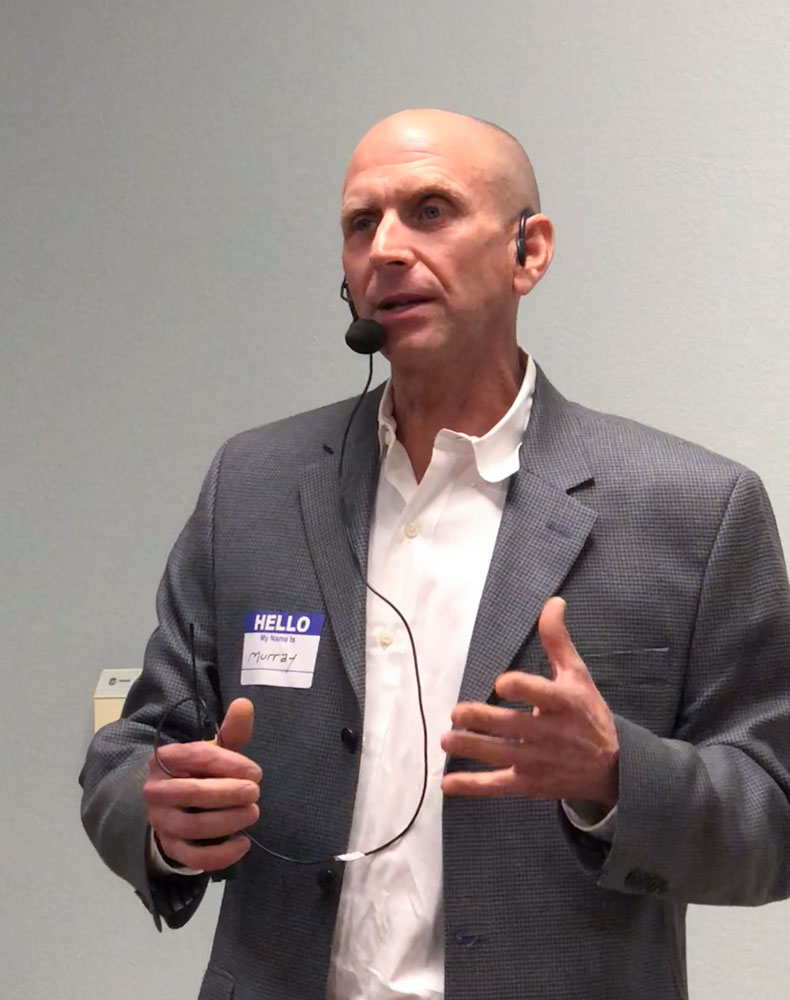
SoCal Beekeeping
Talk by Murray Mosco of Wildflower Meadows
2/7/2018
P. Michael Henderson
The OC Beekeepers had their monthly meeting on Tuesday, February 6 with Murray Mosco of Wildflower Meadows as the speaker. Wildflower Meadows sells VSH (varroa sensitive hygiene) queens. VSH bees can detect if varroa mites are in a developing bee cell and will uncap that cell and remove and discard the larva, essentially preventing the varroa from reproducing in the hive. VSH bees also exhibit VH (varroa hygiene) behavior which is grooming the mites off of each other.
A VSH hive never completely gets rid of varroa because bees from other hives "drift" into the hive, carrying varroa mites, but the level of varroa will be significantly less than a non-VSH hive, and will not significantly harm the hive.

Basically, Murray sells queens that produce hives that can coexist with varroa mites - meaning generally treatment free hives. He commented that we cannot keep throwing chemicals at the bees. It's not good for the bees and the mites eventually develop an immunity to the chemicals.
He sells nation wide and apparently has been very successful - he commented that he sold out for queens for March, April and May in a few days after he opened up sales this year on his web site.
In the early days of Wildflower Meadows, when Murray was just getting started, he sold mostly to commercial beekeepers in southern California. That's a great thing for those of us who keep feral bees because the drones and swarms from those VSH hives are contributing to the genetics of the bees that we capture. Perhaps some of my bees are descendants of Murray's queens.
I had the opportunity to talk with Murray during the break. When I told him that I (and others) are successfully keeping docile feral bees treatment free, he was not surprised. He commented that the Africanized bees in this area are cross breeding with the European bees kept by commercial beekeepers, leading to less defensive "Africanized" bees.
I mentioned my theory that when feral bees set up a hive in an urban area, they have to be less defensive because if they attack people walking by, the hive is fairly quickly exterminated. He agreed and said it was his theory, also - that defensive behavior is not a survival trait in southern California and, over time, evolution will likely remove that trait from Africanized bees in this area.
His bees are wild mated and he talked about the need in a commercial queen raising operation to also raise drones. A virgin queen will mate with up to twenty drones and the drone is killed in the mating. So when you're producing thousands of queens, you need a LOT of drones. So in addition to raising queens, Wildflower Meadows also raises drones. They purchase drone comb from Mann Lake and put two frames of that in each hive to encourage the production of drones.
Since his queens are wild mated, it's possible that a queen can mate with a drone from a highly defensive Africanized hive and the worker bees produced by that queen can bee excessively defensive. If a beekeeper reports that a hive with a Wildflower Meadows queen is excessively hot, Wildflower Meadows will replace the queen, no questions asked.
While talking about feral bees, I mentioned that I'd prefer to obtain feral bees from a cutout where the bees had been hived for a couple of years. If they can survive in the wild for several years, the hive is likely VSH (note that Africanized bees are VSH). He agreed and commented that a late swarm (maybe October) could likely be a non-VSH hive that absconded their previous hive because of varroa mites. If you capture that swarm and hive them, they are not going to survive because they will be overwhelmed by varroa again. You'll likely find an empty hive one day as they abscond again.
Just an aside for the reader, I've found some well established and strong hives in cable TV boxes (in the ground). Around here, the boxes are set in the ground with the top level with the surrounding land. There's a hole in one end of the top for the cable TV person to lift the top. The bees use that hole as an entrance. If there is foliage covering some of the box, all the better for the bees - it provides shade and concealment for the bees. Cable TV is well established and the company people seem to not need access to the boxes very often (interval of years) so the bees can get very established in those boxes, with lots of comb. When doing a cutout, it can be difficult to remove all the comb because they often make it with wires running through the comb - so you have to cut the comb to get it out.